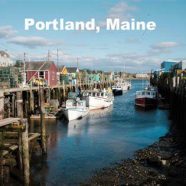
Maine’s largest city, Portland, has become “hot” in recent years. Unemployment is only 2.2%, the food scene is creative and trendy, population growth of its metropolitan area has been strong, and Zillow rates its real estate market “very hot”. Its location appeals to active Millennials, only two hours from Boston, with a stunning coast and nearby mountains offering adventurous skiing, camping and hiking. But questions linger on whether Portland can get beyond its basic lobster and tourism business. City leaders ask what will drive the economy in the future, and whether/ how to re-brand Portland.
Fortunately a “white knight” has arrived to help Portland start an unprecedented transformation to become a high tech hub. As reported in the New York Times in January, the catalyst for this initiative is a Maine native, David Roux, who made a fortune as a Silicon investor. He donated $100 million to Northeastern University in Boston to establish a new graduate school and research center in Portland which will attract students seeking masters in artificial intelligence and machine learning, geared primarily to the life sciences. Roux believes that such a transformation would also involve a re-branding of Portland, converting it into a “modern, tech-led innovation economy” that will ultimately “bring cutting-edge technology capabilities to Maine”. This gamble would be a huge test case, a template for other secondary cities in the U.S.
The Search For New Tech Hubs
Northeastern currently has a network of high tech campuses in Seattle, Silicon Valley, Charlotte, Toronto and London. Portland will have a lot of competition for attracting further technology investments, new innovators and start-ups, however. A study by the Brookings Institute found that 90% of the high technology jobs created from 2005 to 2017 was in the major research cities of Boston, Seattle, San Diego, San Francisco and Silicon Valley. But real estate prices, labor expenses and other cost-of-living factors are skyrocketing in these cities, so the search for alternative innovation hubs for this $5.3 trillion global tech industry now includes secondary cities like Austin, Las Vegas, Phoenix, Detroit and Baltimore. In 2017 for example, 34 technology companies expanded into more than 2.1 million square feet of new office space in 19 markets outside these traditional tech centers.
So what can Portland or other upcoming outlying cities offer to establish a new ecosystem for tech, digital and life science ventures that will further attract and sustain innovation? The potential rewards are enormous, as a successful innovation ecosystem will draw other specialty technologies for sectors like healthcare, marketing, scientific research, financial services, law, and e-commerce which will also need tech talent. It will be a massive undertaking, but it will enable Portland to re-brand itself with the promise of a vibrant, high energy tech hub. This transformation would require at a minimum:
- Access to capital – Roux as the lead investor has already taken the initiative, with more expected in the future from Northeastern contacts
- Access to talent – in addition to Boston, this new Northeastern satellite in Portland (the “Roux Institute”) will become the key source for new innovators to complement an educated work force and prestigious Maine colleges nearby – Bowdoin, Colby and Bates.
- Local business support – Northeastern has an exceptional track record working with businesses in their other campuses, and 10 companies with serious tech needs have already been enlisted to participate in Portland.
- Pro-innovation regulatory and fiscal policy – this has already been demonstrated with the support from the Maine governor, Janet Mills, and Portland officials who are willing to invest in innovation friendly infrastructure as well.
Converting Portland into a prosperous tech hub won’t happen overnight, but it is taking the right first steps for this journey. Today the Portland brand is focused on tourism, as the entry point for “Exploring Maine”. Once this ecosystem opportunity starts to bear fruit, Portland should start its re-branding effort to target dynamic startups, venture capital firms, and young innovators. Its new brand positioning should promise a uniquely exciting lifestyle and the chance to shape this ecosystem to reflect their creative ambitions, innovative ideas and high growth expectations.


